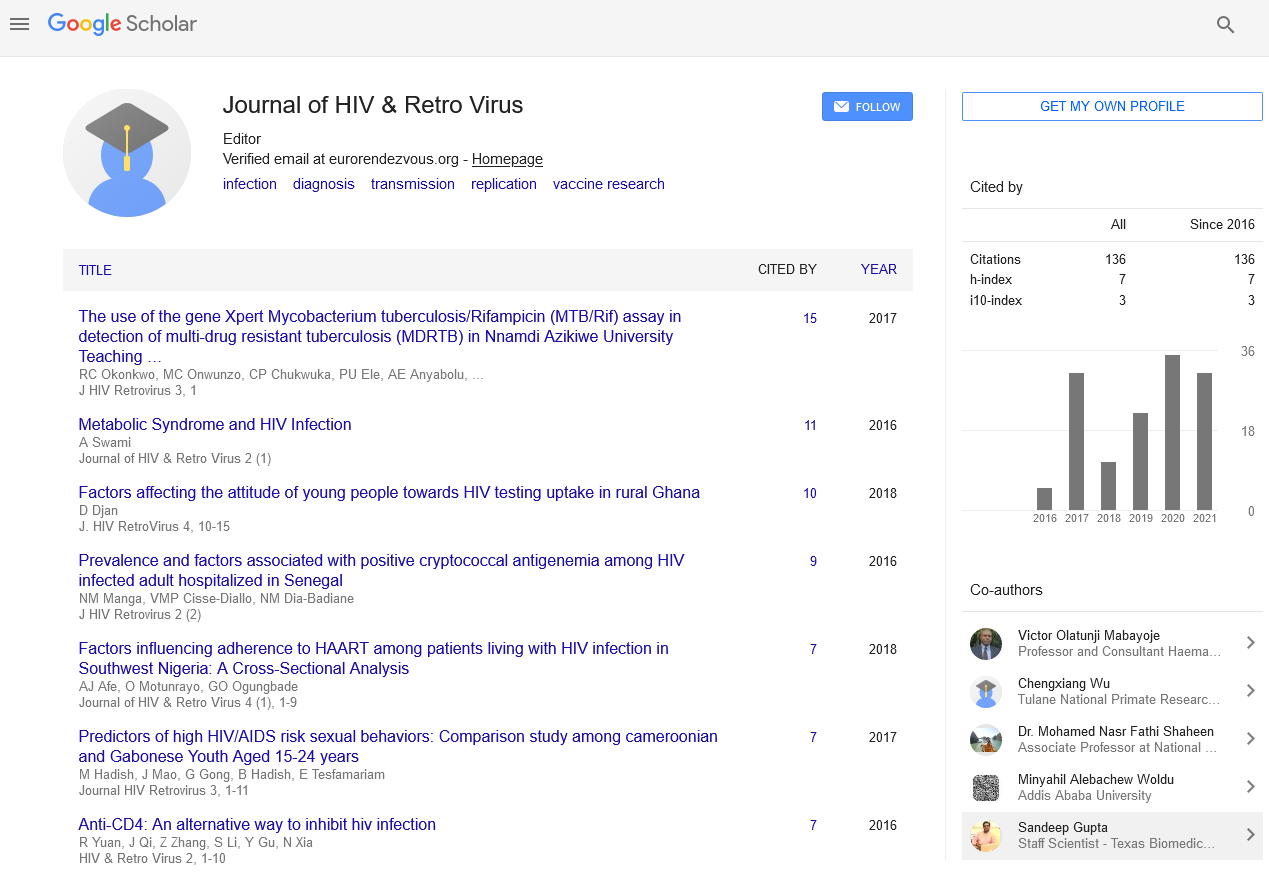Short Communication - (2024) Volume 10, Issue 2
Advancements in HIV Treatment: A Beacon of Hope in the Fight Against the Virus
Tako Aki*
Department of Medical Science, Toyo University, Japan
*Correspondence:
Tako Aki,
Department of Medical Science, Toyo University,
Japan,
Email:
Received: 29-May-2024, Manuscript No. IPJHRV-24-20000;
Editor assigned: 31-May-2024, Pre QC No. IPJHRV-24-20000 (PQ);
Reviewed: 14-Jun-2024, QC No. IPJHRV-24-20000;
Revised: 19-Jun-2024, Manuscript No. IPJHRV-24-20000 (R);
Published:
26-Jun-2024, DOI: 10.21767/2471-9676.10.2.11
Introduction
In the past few decades, the treatment landscape for Human
Immunodeficiency Virus (HIV) has undergone remarkable
advancements, transforming what was once considered a
terminal diagnosis into a manageable chronic condition for
many. With the advent of antiretroviral therapy (ART) and
ongoing research efforts, the outlook for individuals living with
HIV has improved significantly. In this article, we’ll explore
the evolution of HIV treatment, current treatment guidelines,
and promising developments on the horizon. Antiretroviral
therapy, a combination of medications that target different
stages of the HIV life cycle, is the cornerstone of HIV treatment.
These medications work by suppressing the virus, reducing its
replication and slowing down the progression of the disease.
Description
By adhering to a prescribed ART regimen, individuals living with
HIV can achieve viral suppression, meaning that the amount
of virus in their blood is undetectable, and their immune
system can begin to recover. Guidelines for the treatment
of HIV have evolved over time, reflecting advancements
in drug therapies and our understanding of the virus. The
current standard of care recommends initiating ART as soon
as possible after diagnosis, regardless of CD4 cell count, to
maximize the benefits of treatment and prevent disease
progression. Additionally, treatment guidelines emphasize the
importance of individualized care, taking into account factors
such as drug resistance, comorbidities, and potential drug
interactions. While ART has revolutionized the management of
HIV, challenges remain. Adherence to medication regimens can
be difficult for some individuals, leading to treatment failure
and the development of drug resistance. Moreover, access
to HIV treatment and care services may be limited in certain
regions, particularly in low-resource settings and marginalized
communities. Addressing these challenges requires a
multifaceted approach, including improving access to healthcare
services, providing support for medication adherence, and
addressing social and structural barriers to care. The field of
HIV research continues to advance, with ongoing efforts to
develop new treatment options and strategies. One promising
area of research is long-acting injectable therapies, which offer
the potential for less frequent dosing and improved adherence
compared to oral medications. Other areas of exploration
include therapeutic vaccines, gene editing technologies, and
novel drug delivery systems. While these developments hold
promise, further research is needed to assess their safety,
efficacy, and long-term impact on HIV management. Achieving
optimal outcomes with HIV treatment requires not only access
to medication but also support for adherence and ongoing care.
Healthcare providers play a crucial role in educating patients
about their treatment options, monitoring their progress, and
addressing any concerns or challenges they may face [1-4].
Conclusion
Additionally, peer support groups, community-based
organizations, and mental health services can provide valuable
support for individuals living with HIV, helping them navigate
the complexities of treatment and manage the psychosocial
aspects of the disease. The advancements in HIV treatment
represent a beacon of hope in the fight against the virus. With
continued research, advocacy, and investment in healthcare
infrastructure, we can further improve the lives of individuals
living with HIV and move closer to ending the HIV/AIDS epidemic
once and for all. By prioritizing access to treatment, supporting
adherence and care, and addressing the social and structural
determinants of health, we can work towards a future where
HIV is no longer a threat to global health and well-being.
Acknowledgement
None.
Conflict Of Interest
None.
References
- Fanales-Belasio E, Raimondo M, Suligoi B, Butto S (2010) HIV virology and pathogenetic mechanisms of infection: A brief overview. Ann Ist Super Sanita 46(1):5-14.
[Crossref] [Google Scholar] [PubMed]
- Sato H, Ode H, Motomura K, Yokoyama M (2009) Structure and molecular mechanisms of infection and replication of HIV. Nihon Rinsho 67(1):37-42.
[Google Scholar] [PubMed]
- Richman DD, Little SJ, Smith DM, Wrin T, Petropoulos C, et al. (2004) HIV evolution and escape. Trans Am Clin Climatol Assoc 115:289-303.
[Crossref] [Google Scholar] [PubMed]
- Mendoza CD, Martin-Carbonero L, Gallego O, Corral A, Soriano V, et al. (2005) Relationship between drug resistance mutations, plasma viremia, and CD4+ T-cell counts in patients with chronic HIV infection. J Med Virol 76(1):1-6.
[Crossref] [Google Scholar] [PubMed]
Citation: Aki T (2024) Advancements in HIV Treatment: A Beacon of Hope in the Fight Against the Virus. J HIV Retrovirus. 10:11.
Copyright: © 2024 Aki T. This is an open-access article distributed under the terms of the Creative Commons Attribution License, which permits unrestricted use, distribution, and reproduction in any medium, provided the original author and source are credited.

